#it's proscription time
Explore tagged Tumblr posts
Text
sulla : i've made a list
senate : like a to do list ?
sulla : no.
#ancient rome#ancient history#rome#roman history#tagamemnon#roman republic#sulla#lucius cornelius sulla#it's proscription time
107 notes
·
View notes
Note
I didnt get the Odazai twitter joke?
Pffttt then maybe it wasn't a funny joke. What I was trying to say is that as far as I myself could see over there it's socially accepted to harass people over ships, and odazai is one of the bsd ships that's picked on the most for some known unknown reason, so you know ¯\_(ツ)_/¯
#Some time ago I stumbled across some crazy yet hilarious drama over there. People were spreading literal proscription lists not even of–#oda/zai pages themselves but OF PEOPLE WHO FOLLOWED THOSE PAGES#And those lists were just?? The “followed by peaople you follow” list???? Like LMAO what were YOU doing at the devil's sacrament#Like the drama i witnessed that day was just.#Why are you as a oda/zai hater spending so much time looking for oda/zai pages. Do you have anything to share with the class lol#people asks me stuff
10 notes
·
View notes
Text

An 83-year-old priest and a human rights lawyer were among around 25 people arrested for holding signs saying “I oppose genocide. I support Palestine Action” in Parliament Square today.
The action, by protest group Defend Our Juries, was the first organised challenge to the proscription of Palestine Action, which came into effect at 00.01 this morning.
This is the first time a non-violent, direct action group has been designated a terrorist organisation in the UK.
In an open letter sent to Met police commissioner Mark Rowley on Friday, Defend Our Juries outlined its plans. “We would like to alert you to the fact we may be committing offences under the Terrorism Act tomorrow, Saturday 5 July, in Parliament Square at about 1pm,” it said.
It portrayed the action - which it said would be nonviolent and pose “no risk whatsoever of anyone being harmed” - as both a challenge to the ban and a test of how it will be enforced.
“If we cannot speak freely about the genocide that is occurring, if we cannot condemn those who are complicit in it and express support for those who resist it, then the right to freedom of expression has no meaning, and democracy and human rights in this country are dead,” it said.
Reverend Sue Parfitt, 83, told Novara Media the group was “testing the law”. She said she wasn’t afraid of being arrested. “I know that we are in the right place doing the right thing,” she said. “As my friend Ruth always says, ‘we cannot be bystanders’.”
Minutes later, police began making arrests.
Palestine Action applied to pause the ban in the high court yesterday, but lost both a hearing and an appeal shortly afterwards.
Speaking to the Guardian on Friday, Raza Husain KC, representing Palestine Action founder Huda Ammori, described the decision as “an ill-considered, discriminatory and authoritarian abuse of statutory power”.
The Met did not respond to Novara Media’s request for comment.
5 July 2025
2K notes
·
View notes
Note
Hi babess ! Could I please request a Ellie or Abby with a reader that has ADHD ? Personally have it and honestly it would be amazing to read you writing about it ❤️ DONT WORRY TAKE YOUR TIME BABES



‧₊˚ ☆ ୭ ✧˖°
ellie x reader!with adhd
a/n: EKK I HAVNT GOTTEN A REQUEST IN FOREVER! IM SO HAPPYYY. and yes yes ofc!! i have adhd too so this was fun! ( collage au, and loser!ellie ofc)
‧₊˚ ☆ ୭ ✧˖°
☆ ellie keeps you in check whenever you need it. when you cant stay focused she’ll make sure your doing what you need to, by checking in on you, or maybe taking breaks with you to do something else. she definitely has like a reward system for you too. like every 30 minutes you study you two play a match of mario cart or something. “ellliahhhh how much longer on the timer???”
“u got 10 minutes. keep going babe”
“are you suree??” ellie holds up her phone timer and you groan.
“and oh, dont worry ill kick ur but in the next round too.” ellie sarcastically added as she turned back to her own studies. you pick up the nearest pillow and chuck it at her.
“asshole!” you giggle.
☆ ellie loves listening to you ramble about the most irrelevant stuff. oh and she finds it so adorable when you lose train of thought and switches subjects. “wait what was i talking about before?”
“how water isn’t wet.. i think?”
“OH RIGHT! like it doesnt make s-“
and then she’ll just giggle at you questioning science for the sixth time today.
☆ finds you’re collection of random shit absolutely adorable.
“and whats this?”
“oh, thats my goggly eye collection!”
“and this one?”
“my rubber duck collection. duh?” you then proceeded to explain to her how every duck you collect gets its own name and backstory, THENNN tell her all their names and backstories. she try’s to keep up with all the names and relationships between the ducks & has to asks shit ton of questions.
“wait okay, so jack and millie are dating, but jack is from another pond so millie cheats on him with sarah??”
“yes exactly.”
“scandals” she giggles and fakes her shock.
☆ okay so we know ellie’s more laid back and chill, but when you’re mind starts going crazy, so does hers and she’s bouncing off the walls with you. so now all the sudden both of you are singing Katy parry, jumping on the couch. no music playing, just y’all’s off pitch voices attempting to hit those notes and failing horribly.
☆ and ellie will pick up your proscription every month so you don’t have to. you don’t have to tell her to, and honestly you’d forget yourself if she didn’t do it for you. you’ll just find the new bottle sitting on the bedside table in your dorm when you get back from your lectures.
☆ going off that a little, i think she probably has copy’s of your dorm keys & shit like that so you dont loose anything. she keeps it on her carabiner.
☆ OOUU OUUU ANNNDDD SPEAKING OF. she bought you a carabiner one year for your birthday before your freshmen year, and by the end of it you had lost it.. with all of your belongings too.! so guess its a good thing ellie keeps extras huh?
#tlou2#tlou#tlou fanfiction#girl in red#ellie tlou#ellie x fem reader#wlw#lesbian#wuh luh wuh#loser!ellie x reader#loser!ellie#MakeEllieSubAgain2025
136 notes
·
View notes
Quote
I have no doubt whatever of the future. I know there are times in the history of all reforms, when the future looks dark... I, for one, have gone through all this. I have had fifty years of it, and yet I have not lost either heart or hope... One by one, I have seen obstacles removed, errors corrected, prejudices softened, proscriptions relinquished, and my people advancing in all the elements that make up the sum of general welfare.
Frederick Douglass, "The Race Problem (1890)"
61 notes
·
View notes
Text
Danton getting warned about his upcoming arrest compilation
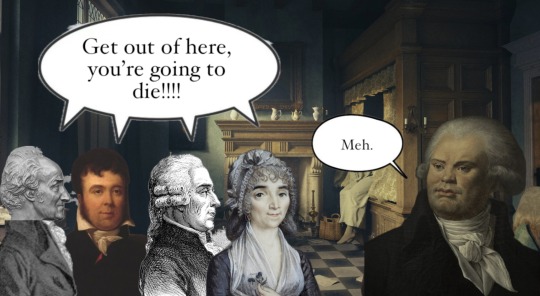
One day I told Danton: ”Your carelessness surprises me, I understand nothing of your apathy. Don’t you see Robespierre is conspiring to lose you? Won’t you do anything to prevent it?” ”If I thought that he has so much as thought about it, [Danton replied], I would eat his entrails!” Five or six days later, this man so terrible allowed himself to be arrested like a child and slaughtered like a lamb. Mémoires sur la Convention et le Directoire (1827) by Antoine-Clair Thibaudeau, page 60.
One morning Panis entered [Danton’s] office and found him warming himself by the fire and playing with his nephew, who was still a child. Here, read your proscription and mine! [he said]. And he presents him with a draft of an arrest warrant, written by a member of the government committees. Danton, having read it, replied coldly: They will not dare!... Panis, in despair, withdrew. (M. Menuel, this nephew of Danton, told me about this meeting. Panis had also told it to a few people who confirmed it to me). Histoire de la Révolution française: 1789-1796 (1851) by Nicolas Villiaumé, page 188.
The day before the arrest of Danton and Camille Desmoulins, he (Rousselin de Saint-Albin) ran panting to both of them several times, he engaged them, begged them to be on guard at a time when Robespierre and Billaud were plotting their downfall. But Danton thought he was too strong to listen to a warning that would have saved him. “They will not dare,” he said; then, looking at himself in a mirror:“Let us not fear anything, children that you are! See my head, doesn't it sit well on my shoulders? And why would they want to kill me? What's the point? Among some friends who were present at this interview, one said: ”There are many proscribed deputies who fortunately escaped. Dulaure, Doulcet, Louvet retired to Switzerland. What prevents you from absenting yourself for at least some time?” Danton replied: “What does it mean to absent yourself? Isn’t that emigrating? Do we take our homeland with the sole of our shoe?” Camille shared this opinion. Alas! It was blind security. ”I want,” he said, as he repeated going to the scaffold, ”I want to share the fate of Danton, whatever it may be.” Œuvres de Camille Desmoulins (1874) by Jules Claretie, volume 2, page 393. Claretie claims this anecdote originates from the mouth of Desmoulins’ mother-in-law.
The two committees signed arrest warrants against Danton, Desmoulins, Philippeaux and Lacroix for the following night. In the morning, Marat's sister, having learned about it through the indiscretion of an employee of the Committee of Public Safety, who had heard a few words, ran to warn Danton. As he had already left for the Assembly, she went there and called out for him. “Mount the rostrum,” she said to him. ”You have no time to lose, because the rumor is that you have already been arrested: the opportunity is favorable: Tallien presides: your friends are numerous, and your eloquence will crush the committees. In circumstances such as these, it is the one who attacks who wins.” ”I would have to proscribe them, replied Danton; because I know Billaud and Robespierre: they are relentless.” ”But since they want your head, take, if necessary, theirs, remember that, without you, Robespierre will very quickly be swallowed up himself. My brother told me the day before his death that he was only good at making speeches, that he understood nothing about government, and that he would lose his head at the first crisis. If he abandons you, his friend, you, the man of August 10, he is only a villain; he must perish. Collect your thoughts for an hour, and mount the rostrum: change the committees; proscribe them if necessary. "Well! Once they have me arrested, would I not be acquitted by the revolutionary tribunal and brought back in triumph, to the Convention, like the Friend of the People was? Then my enemies will be confounded and order will be restored without bloodshed.” ”Don't be fooled: last year the tribunal was impartial; now it is only the slave of the committees, which after having hindered the defense of the Girondins and that of Vincent, will prevent you from speaking.” Danton fell into reverie. “Above all, remember,” added Mademoiselle Marat, “that you must neither flee nor hide. Several patriots, in their friendship, have proposed it to you; you were even offered asylum. Danton has no other place than the rostrum. Get up there without delay; this is not just about your salvation, but of that of all of your friends, but of the salvation of the republic. Farewell." Danton shook her hand and left her, promising to not lose time. Histoire de la Révolution française: 1789-1796 (1851) by Nicolas Villiaumé, page 279. Villiaumé had gotten in contact with Albertine Marat before her death, so it’s most likely she herself this anecdote originates from.
”Oh! If I had known that they would arrest me,” cried Lacroix [at the Luxembourg prison]. ”I knew it,” Danton replied, people came and warned me, and I couldn’t believe it.” ”Trois mémoires de la collection de Nougatet” cited in Histoire parlementaire de la Révolution Française, volume 32, page 210.
Danton, placed in a cell next to Westermann [in the Conciergerie], didn’t stop talking, less to be heard by Westermann than by us. […] Here are some phrases I retained: […] ”I knew I would get arrested.” Mémoires d’un detenu pour servir à l’histoire de la tyrannie de Robespierre(1795) by Honoré Riouffe, page 88.
#georges danton#frev#french revolution#frev compilation#albertine marat#robespierre#jesus did you WANT to die georges???#or was he just convinced there was no way he would get arrested/would 100% beat the tribunal if placed in front of it
93 notes
·
View notes
Text
Bits and pieces of the still incredibly written backstory of Elden Ring continue to poke out from the dogwater, as it were.

St. Trina, as we learn, was a specific aspect of Miquella that was made separate: In Miquella's words, St Trina was the embodiment of his 'love.' And when he abandoned St Trina, he abandoned that aspect of himself that made her.
This newly introduced example reveals to us what the nature of Radagon's exactly was, in turn.
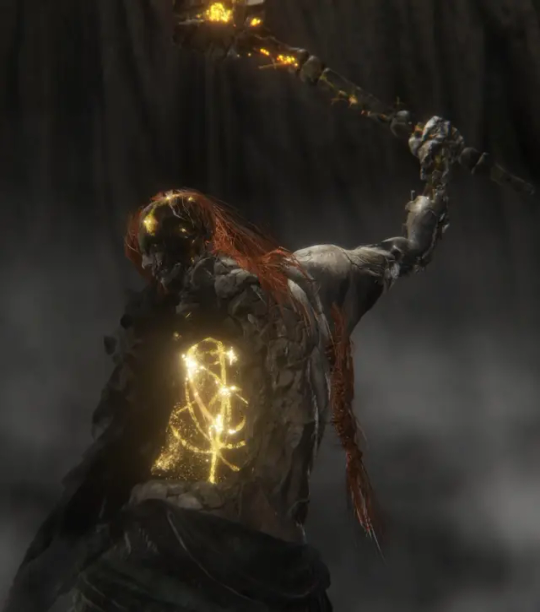
Radagon, the 'other half' of Marika in the exact same way that St Trina had been for Miquella, we learn here, had *himself* been a specific singular aspect of Marika's emotions or feelings.
With St Trina having been made out of Miquella's 'love.'
You wonder, too, what Radagon should have been made from.
What aspect of herself did Marika separate into her second person, as called by her the "Loyal Dog of the Golden Order"? We know Radagon was created prior to the creation of the Golden Order itself, since he was involved in the invasion of Liurnia.
So at the same time as Marika was married to Godfrey, begetting Godwyn and Mogh and Morgott. Radagon was married to Renalla, begetting Rykard and Radahn and raising the potential successor of Marika--the Empyrean Ranni. He was given a massive amount of responsibility, the seeming crux of the Liurnian-Leyndell alliance that ended the Liurnian Wars that Marika's empire was losing, and he by every account was completely dedicated and successful; even weakening the strength of the Carian royal family by reducing their practicing of astrology.
All yet, when push came to shove: After Godwyn was assassinated and Marika sought to destroy the Elden Ring. It was Radagon who dropped everything he had and stepped in to stop her.
"Proudly" as his Golden Order Greatsword says,

Radagon divorced his first wife, married his 'original self,' begettedthe Twin Prodigies Miquella and Malenia as two more potential successors to Queen Marika, set up the brutal inquisition and censorship of the Age of Radagon headed by his own son Rykard, and was even involved with the very the development of Golden Order fundamentalism!

Radagon did so much fucking stuff! He was so damn proactive! So what exactly must he have been!?
That Marika initially separated from herself? And who went on to try and stop her very own plans when they turned against the wishes of the Greater Will??
This conflicting 'half' of her original person! That nonetheless was all this strongly willed on his own!?
What part of Marika COULD Radagon have originally been!?!?!?
And it's awesome. It's really really well-designed writing.
Frankly, even, it's genius. It's not anything revolutionary in terms of narrative devices or anything like that, but it's really elegant. It's really meaningful and concise, and it's really cool!!!
A lot of Elden Ring's base game is, or now maybe--was. (It having been the basis of my entire show on YouTube.)
But the actual story, instead of solely the backstory, of the DLC, unfortunately, is not!
You ever seen a boss item whose entire description was literally entirely the game just fucking QUOTING ITSELF?
Hyetta at Frenzied Flame Proscription: "Become their lord. Take their torment, despair. Their affliction. Every sin, every curse. And melt it all away. As the Lord of Chaos."
Ghost outside Church of Inhibition in Liurnia: "Ahh, Lord Vyke, it seems that you were no lord, after all."
Midras's Flame of Frenzy, from killing Midras, Lord of Frenzied Flame:

Or! Better yet, ANOTHER boss spell, whose entire description is dedicated to literally just acknowledging its fucking colour!!
Land of Shadows, from killing the Scadutree Avatar:

I definitely sure wish I still hadn't!!
In fact, I don't think the level of vacuousness from Shadow of the Erdtree's descriptions has ever been seen before!
Not even in Dark Souls 3!!
AUGH
#tlgtw ooc#erwset#elden ring#elden ring lore#shadow of the erdtree spoilers#shadow of the erdtree#queen marika#radagon of the golden order#miquella the unalloyed#st trina#Outright actually literally 0 meaningful information provided in either of these two items#each of them the 1 out of only 2 rewards available for beating a major boss.#these are also just two of the worse examples of some of the most meaningless fucking item description I've literally ever read#I could not fucking believe it when I finally beat these bosses at the very end of the DLC's completion. And that that was it.#Heck on earth#Why couldn't they have just delayed it
153 notes
·
View notes
Text
Writing Notes: Ethnocentrism & Cultural Relativism

ETHNOCENTRISM
The tendency to look at the world primarily from the perspective of one’s own culture.
Part of ethnocentrism is the belief that one’s own race, ethnic or cultural group is the most important or that some or all aspects of its culture are superior to those of other groups. Some people will simply call it cultural ignorance.
Often leads to incorrect assumptions about others’ behavior based on your own norms, values, and beliefs.
Example: In extreme cases, a group of individuals may see another culture as wrong or immoral and because of this may try to convert, sometimes forcibly, the group to their own ways of living.
War and genocide could be the devastating result if a group is unwilling to change their ways of living or cultural practices.
Ethnocentrism may not, in some circumstances, be avoidable.
We often have involuntary reactions toward another person or culture’s practices or beliefs but these reactions do not have to result in horrible events such as genocide or war.
In order to avoid conflict over culture practices and beliefs, we must all try to be more culturally relative.
CULTURAL RELATIVISM
The principle of regarding and valuing the practices of a culture from the point of view of that culture and to avoid making hasty judgments.
Cultural relativism tries to counter ethnocentrism by promoting the understanding of cultural practices that are unfamiliar to other cultures such as eating insects, genocides or genital cutting.
Example: Consider the common practice of same-sex friends in India walking in public while holding hands. This is a common behavior and a sign of connectedness between two people. In England, by contrast, holding hands is largely limited to romantically involved couples, and often suggests a sexual relationship. These are simply two different ways of understanding the meaning of holding hands.
Someone who does not take a relativistic view might be tempted to see their own understanding of this behavior as superior and, perhaps, the foreign practice as being immoral.
CULTURAL RELATIVISM: Problems
Despite the fact that cultural relativism promotes the appreciation for cultural differences, it can also be problematic.
At its most extreme, cultural relativism leaves no room for criticism of other cultures, even if certain cultural practices are horrific or harmful.
Many practices have drawn criticism over the years.
Example 1: In Madagascar, the famahidana funeral tradition includes bringing bodies out from tombs once every seven years, wrapping them in cloth, and dancing with them. Some people view this practice disrespectful to the body of the deceased person.
Example 2: Today, a debate rages about the ritual cutting of genitals of girls in several Middle Eastern and African cultures. To a lesser extent, this same debate arises around the circumcision of baby boys in Western hospitals.
When considering harmful cultural traditions, it can be patronizing to use cultural relativism as an excuse for avoiding debate.
To assume that people from other cultures are neither mature enough nor responsible enough to consider criticism from the outside is demeaning.
CROSS-CULTURAL RELATIONSHIP
The idea that people from different cultures can have relationships that acknowledge, respect and begin to understand each other’s diverse lives.
People with different backgrounds can help each other see possibilities that they never thought were there because of limitations, or cultural proscriptions, posed by their own traditions.
Becoming aware of these new possibilities will ultimately change the people who are exposed to the new ideas.
This cross-cultural relationship provides hope that new opportunities will be discovered, but at the same time it is threatening. The threat is that once the relationship occurs, one can no longer claim that any single culture is the absolute truth.
Source ⚜ Writing Notes & References
#writing notes#culture#psychology#writeblr#dark academia#writing reference#spilled ink#studyblr#light academia#literature#writers on tumblr#writing prompt#poetry#poets on tumblr#writing inspo#writing ideas#writing inspiration#creative writing#writing resources
115 notes
·
View notes
Text
Hamiathes’s Gift Exchange sign ups are open!
If you've done a Yuletide-style exchange on AO3 before, the process should be similar. If you haven't, have a look at the explanation and examples below, check out the FAQ and rules on AO3 and let me know if you have questions!
Also, please spread the word—the more, the merrier. Both fanfic writers and fanartists are welcome to participate!
The signup link is here!
Quick points:
The tagset is big! Consider taking some time to go through it if you want.
Signups are open until Friday, August 3 @ 8pm ET. See what time that is for you!
You'll need an AO3 account to sign up. You can request one here if you don't already have one. We have some extra codes if the wait list is too long so please ping me if that’s the case!
Please read the rules before signing up so you know what you're agreeing to do
You can see what other people have requested/offered within the exchange itself, as well as on the AO3 Automagic App — group by "character" instead of "fandom" for best results. Note that you may have to re-scrape in order to see the most up to date signups.
Check below the “read more” for more info on how signups work, the “optional details” field, and how to submit your Do Not Wants. And as always, please reach out here or in the QT discord if you have questions!
How signups work:
Each of us will use a form on AO3 to make requests and offers.
You must make at least two requests, each of which specifies a character or from the tag set and indicates that you’re requesting fanfiction, fanart, or both. You may make up to eight requests. Each request can also include optional details about your preferences, ideas for prompts, etc. More about that below. Your assigned writer or artist is responsible for creating a fanwork featuring the character or relationship in any one of your requests.
Offers are simple—you’ll just list the characters, relationships, or worldbuilding elements from the tag set about whom you’re willing to write or illustrate, specifying whether you’re offering fanart, fanfiction, or both
An important note on relationships--if characters are connected by &, this refers to a platonic relationship. If they are connected by an /, this refers to a romantic or sexual relationship. For example, if you want a story or artwork featuring Irene, request Attolia | Irene. If you want a story or artwork featuring Irene and Relius as friends, request Relationship: Attolia | Irene & Relius. If you want a story or artwork featuring Irene and Relius in a non-platonic, request Relationship: Attolia | Irene/Relius.
Optional details:
When you're making requests, it can be helpful to give your author/artist a little more detail than just the characters you're requesting. Remember that your author or artist is only required to create a work featuring your specified characters. If you ask for a specific story prompt or for art in a particular style, they may not be able to meet that request, and they aren't required to. Try not to be too proscriptive here—think of it as a way to explain why you like these characters and why you're interested in getting fanwork about them, and a way to kickstart your author/artist's creativity if they need it.
You can include either a link to a letter hosted on your journal or type directly in the optional details box in the signup form. If you're linking to your journal, please make sure it isn't friends-locked, or your creator won't be able to see it!
Do Not Want list:
If there's anything you specifically don't want to receive in your gift, you can include a Do Not Want (DNW) list in the optional details section. Examples might be things that squick or trigger you or 'ships you aren't interested in. This isn't about making value judgments, just about indicating your comfort level and making this a good experience for everyone.
Authors and artists must respect this list. When you're specifying Do Not Wants, please include them in the optional details text box in your signup, not in the letter, so I as the mod can be aware of them. If they are not in the optional details box, I cannot enforce them.
Examples of DNWs: sexual content, kidfic, violence, character death.
Treats
tl;dr: if you're open to receiving gifts, make sure your AO3 is set to receive gifts and consider indicating in your letter/optional details that you're open to receiving treats!
In February 2022, AO3 released a new setting that allows users to choose whether or not they can receive extra gifts. If a person has the setting "Allow anyone to gift me works" selected in their preferences, then AO3 users can give extra gifts to that person, including Hamiathes's Gift Exchange treats. If this setting is not checked, only a user who has an exchange assignment for that person, or who has claimed their prompts in a prompt meme, can give them gifts.
Because of this setting, we have encouraged people to state in their sign-up or profile page if they're open to treats. Mods can also check who's able to receive treats (especially because users could choose to change this setting during the event). If you're not sure if someone would like treats, you are very welcome to ask the mods.
Please also double-check your own settings if you would like to receive gifts! If you created your account after February 2022, you may need to change your settings from the default.
Comments
Two notes about commenting, one about giving and one about receiving:
It's encouraged to comment on your gift(s) to show appreciation to your author and/or artist for creating it. Best practice during exchanges is to comment before author reveals (September 26). If you do not think you will be able to comment in the first few days after gifts are revealed, you may want to leave a placeholder comment to let your creator know that you will be back to read/comment later.
AO3 has recently changed it’s default commenting setting on new works to “logged in users only.” If you’d like to be able to receive comments from people who aren’t logged in (“guest” comments), you’ll need to change that setting when you’re posting your work
Happy prompting!
26 notes
·
View notes
Text
i mentioned it in the replies of one of my posts, but i love how tied morgott and mohg are in soul despite their differences. their great runes occupying the same tower is one thing, but the possibilities that they work together in some capacity despite having such fundamental differences in beliefs is so interesting.
there's nothing that explicitly states that they're collaborating on anything, but i feel you can get real far if you let your mind wander. their shared occupation of the shunning grounds, morgott and mohg's matching shackles, morgott's sword having that bloodflame slice ability, the complimentary ways that they fight with morgott's speed and mohg's strength, mohg's illusion guarding the frenzied flame proscription with morgott's seal hidden behind him... there's so much to work with there!
the last part is what interests me the most, tbh. something peculiar about this setup is how morgott's illusions work; when he summons margit in stormveil and out in altus, gold shimmers around him while a symbol bearing the sigil of the crucible appears on the ground beneath margit. when he summons godfrey's spirit, the same symbol and golden hue appears on him. but with mohg, no such gold appears, nor any symbol. he merely materialises out of thin air.
this is interesting because of the fact that this means morgott didn't summon him. not only because he doesn't show up with the symbol or gold, but also because when you kill morgott, his margit illusions in stormveil and altus also disappear if you don't kill them before morgott. this doesn't happen with mohg in the sewers, who can be fought before you even get to godfrey, even if you kill mohg in his palace first before any of them. but why is that?
i personally believe that it's because mohg's illusion is not one born from the same magic that morgott uses for his incantations. i know, shocking, the golden order fanboy and the formless mother fanboy use different spells, but it does serve to explain why mohg's illusion stays even when the man himself was slain first. it sets their magic apart very clearly and decisively, but also grants more insight into their collaboration.
mainly because i think that morgott and mohg working together on this can fit into 2 different possible reasonings behind the nature of their relationship. the first being that this is a begrudging truce built off of mutual respect and fear of the frenzied flame, and that they don't agree on much else beyond that and are estranged otherwise. the second being that they still work together in some capacity and still hold even the slightest bit of affection for each other, and guardianship over the frenzied flame using the magic they are best at (illusions and seals) is testament to that.
both are plenty compelling, though i find myself more drawn to the 2nd reason. i wonder if there was a time before miquella where mohg was establishing his dynasty and his brother, a fanatic of the golden order, turned a blind eye to his actions out of love. its probable that morgott and mohg never publicly acknowledged their familial connection, since neither varre nor ansbach make any mention of mohg having a brother, nor does anyone (barring shaneheight) know that morgott is actually an omen. it could be that, when mohg left the sewers to establish his dynasty, morgott let the matter lie and the two went their separate ways rather amicably, if a little bitter.
as per usual, this was just a huge ramble with no direction. just musings pretty much. i love thinking about these guys a lot.
#elden ring#elden ring rambles#omenboys#morgott the omen king#margit the fell omen#morgott#mohg lord of blood#mohg
143 notes
·
View notes
Text
The British direct action activist group Palestine Action is now banned in the United Kingdom after a High Court judge refused to grant an application for interim relief, following the passing of a vote in Parliament that proscribed the group as a terrorist organization.
That means that expressing support for the group has itself become a criminal offense, theoretically punishable by up to 14 years in prison. An 83-year-old vicar was one of many individuals arrested at protests in support of the now-proscribed group.
I am a Middle Eastern war correspondent and political commentator who has a long history of supporting the expansion of proscription in the United Kingdom. However, I personally regard the claim that this decision is in the public interest as absurd and risible.
Palestine Action is not now, nor has it ever been, a terrorist organization. Its proscription by the Labour Party government demonstrates a total failure to deal appropriately with the problem posed by the group. Watering down the definition of terrorism will have lasting consequences for law enforcement, counterterrorism, and national security.
To be clear, this is not a defense of Palestine Action nor its methods, nor would I agree with pundits who have argued that Palestine Action is a strictly “non-violent” protest group. Police officers were assaulted with sledgehammers and other weapons during the action that the now-proscribed organization undertook in Bristol in August 2024.
A more recent action undertaken by the group in late June at RAF Brize Norton in Oxfordshire, during which members broke into the military airfield and caused millions of pounds worth of damage to two Voyager aircraft, was a major embarrassment for the Royal Air Force and the British government. Home Secretary Yvette Cooper was right to point out that these activities “meet the threshold set out in the statutory tests established under the Terrorism Act 2000” in that they represent a “risk.” The question is whether that risk is serious enough to merit proscription.
The use of the nuclear option of proscription in this instance is a mistake. Not every group banned under the Terrorism Act in British law needs to be as dangerous as al Qaeda or the Islamic State, or as extreme as domestic terrorist organizations such as National Action. Palestine Action, despite its criminal activities, still falls well short of the definition of terrorism as it exists in British law.
The threshold for banning a group entirely has previously been high. Previous British governments have agonized over proscription and the justifications for it, with David Cameron failing to ban the extremist, though nonviolent, Islamist group Hizb ut-Tahrir during his time as prime minister despite his threats to do so, although the organization was eventually proscribed in 2024. It took decades to finally proscribe Hezbollah, and the British state still has not proscribed the Islamic Revolutionary Guard Corps, the branch of the Iranian Armed Forces that coordinates terrorism throughout the Middle East and has been linked to several foiled terrorist plots in Britain that are going through the courts.
Palestine Action’s campaigns predate the current Israel-Hamas conflict in Gaza. The group dates back to 2020, when a group targeted Elbit Systems, an Israeli military technology contractor that operates 16 different sites across the United Kingdom with an export license granted by the British government.
Any campaign needs to be judged on its merits, and without endorsing Palestine Action’s violence against police officers or attacks on Israeli charities, the government should recognize that anger toward the Israeli military and British support for it is both widespread and driven by very different motivations than terrorism.
A useful comparison here is the environmental group Just Stop Oil, which regularly engaged in criminal damage in the pursuit of goals that the wider British public sympathizes with. No amount of prosecution or threat of prosecution of Just Stop Oil’s activists stopped them from direct action, but the United Kingdom’s decision to end new oil and gas licenses in the North Sea did.
The British state should not acquiesce to the demands of any random activist group, but the Labour government claims to be committed to both a green agenda and opposing Israel’s actions in the occupied Palestinian territories. There are substantial policy proposals that the government could enact tomorrow—such as banning export licenses for Israeli military contractors—that would render Palestine Action obsolete overnight without risking the dilution of British counterterrorism legislation. One of the first acts that the Labour government undertook with regards to foreign policy was the suspension of 30 arms licenses to Israel, a major break with the Conservative Party’s policy of overt support for Israel’s campaign in Gaza.
Because South Africa’s case accusing Israel of the crime of genocide is still ongoing at the International Court of Justice, the legal scrutiny behind the British state’s actions with regard to its relationship with Israel is only going to intensify. The government’s position following its last arms export review does not go far enough to defend it from charges of actively aiding Israeli military atrocities.
Palestine Action is not an admirable group. While Syrian paramedics and medical facilities were being targeted in a systematic Russian and regime bombing campaign that included the use of chemical weapons, Huda Ammori—the founder of Palestine Action—was engaged in conspiracy theories parroting Russian conspiracy theories about Syrian rescue workers as they were being systematically targeted in Russian air strikes. These are not people who should be able to claim the moral high ground over a Labour government.
But rather than prosecuting individual activists for criminal damage or other established charges, the government has effectively handed Palestine Action a massive moral victory by the use of extreme measures. Every well-meaning pensioner who faces a draconian penalty for holding up a sign makes a mockery of not just justice, but also of the definition of terrorism itself.
It will be hard for the government to make a much-needed U-turn on this action. The legal challenges could eventually offer it a way out with grace. But this is an ignominious chapter for the young Labour government, and one that may set a precedent to target other direct action protest groups. That would undermine the very serious need for robust counterterrorist legislation in the United Kingdom. Palestine Action is simply not in the same basket as groups such as Hezbollah that have actively sought the death of British citizens.
But even if it foolishly insists on keeping Palestine Action on this list, the U.K. government can still remove the drivers of criminal action. By reversing the remaining Israeli arms export licenses and suspending the activities of groups such as Elbit Systems in the United Kingdom, Labour can defang public anger—and prevent itself from being further complicit in Israeli military atrocities in Gaza, the West Bank, and the wider Middle East.
12 notes
·
View notes
Note
hello! I was wondering are there any etiquette rules for andorians that would confuse humans and vice versa? Thank you.
Hello, Skygirl! Sorry for taking so long to answer - still a bit broken, so typing is a bit uncomfortable!
To answer this question, first I'm going to break down what etiquette actually is. I'm going to keep it pretty simple, because literal tomes have been written about the nuances of etiquette in various cultures, and I'd rather not rehash the last five hundred years of social standards across the world.
Etiquette is defined in the Oxford dictionary as "the customary code of polite behavior in society or among members of a particular profession or group." This code is usually determined through a combination of majority opinion, traditional values, religious proscriptions, and social hierarchies.
From there, etiquette can be further divided into categories of politeness and manners, and business etiquette.
Politeness and manners basically come down to self-regulation to follow a social code of conduct by following normative behavioural standards and being, overall, pleasant company. A person has good or bad manners depending on whether or not they can adhere to these social standards, and an individual may have good or bad adherence to different types of manners relating to hygiene, courtesy, and social norms all at the same time. So, hypothetically, you could have a perfectly polite person with terrible hygiene and a weird disregard for others' personal space. Or, conversely, someone with impeccable hygiene, middling social awareness, and absolutely terrible manners. Literally any combination is possible, and one can see this just by looking at the folks who surround us every day.
Now, business etiquette is a little different in that it's much more goal-oriented and involves the necessary adherence to ethics and norms required to successfully facilitate transactions and generate profit. Business ethics can vary quite a bit between corporate bodies, and it's difficult to standardize a universal code of conduct because of the unique nuances each culture has regarding business, which usually results in a kind of culture shock for all of the parties involved.
A common example is the practice of napping at work, which in Japan is often seen as a sign of something called "inemuri" - earnestness and dedication to one's work, resulting in one working so hard that one is exhausted and falls asleep at their post. In North America, however, napping at work (when not on your break, and sometimes not even then) is a good way to get written up and fired. The two approaches are somewhat incompatible, as you can clearly see.
So, looking at all of the above, I think we can pretty confidently say that there are definitely going to be some things Andorians and Humans trip over when dealing with each other - after all, it still happens regularly within Human cultures, and we at least have the benefit of at least being the same species!
So! What would some common sticking points be?
In terms of politeness and manners, I could easily see Humans stumbling over the highly ritualized customs of the Andorians. Andorians society has developed over time to be very rigid in structure and social norms in every day interactions as a means of preventing internal conflict, which often gives Humans the impression that Andorians are cold and unfriendly. In truth, Andorians are only cool and distant with strangers, but their demeanour and a lack of expressiveness in their faces (due to chitin) makes them seem stoic and really quite unapproachable to the uninitiated even well past the initial introductions and early acquaintanceship.
Additionally, while Humans and Andorians largely agree on standards of hygiene and personal grooming there are a number of differences in how some of these things are treated within the different cultures.
For example, Andorians would sit and soak in mineral hot springs all day, if they could reasonably get away with it, to the point of conducting family meetings and minor business while soaking - unlike Humans, Andorians do not easily overheat and faint, nor does prolonged exposure to high heat bother them overly much. This habit of languishing in the water for hours on end is something which Humans tend to find excessive and, when it comes to meetings, inappropriate. Additionally, Andorians are fastidious about bathing prior to soaking, and forgoing that step is considered not only rude but incredibly unsanitary - a step which some Humans skip, or roll into a single event with soaking, to the horror of the Andorians. Adding further complications to such things, the Human tendency in certain cultures to view all nudity as inherently sexual baffles Andorians, who frequently soak together in familial, bonded, or mixed groups and see no issue with such things.
Similarly, grooming each other is often a sign of trust and affection amongst Humans and therefore not something we allow strangers to do outside of specific circumstances (barber/salon, wedding prep, etc.) As a very social and physical species, Andorians have no such compunctions about contact with others ranging from family to work colleagues and acquaintances. Andorians are very touchy and mean absolutely nothing by it most of the time, but they don't always remember that Humans do things a bit differently and have different ideas of what is and is not appropriate.
Cosmetics as part of personal hygiene and grooming can also be a point of confusion, as Andorians are fond of using brightly pigmented colours around their eyes and mouths across both sexes, even in professional environments. Humans, meanwhile, primarily market cosmetics at women, using products ranging from subtle to neon, and such a strongly gendered association would be considered bizarre on Andoria to say the least.
In terms of personal conduct in social situations, Humans can find Andorian customs to be extremely rigid and difficult to navigate without prior research. Andorians use a number of visual and verbal cues to indicate who they are, what Clan they belong to, and their station in society that are lost on most Humans who haven't taken the time to prep in advance. An Andorian can tell at a glance what most Humans need to play 20 Questions to find out. In fact, the very act of inquiring about these details inevitably irritates the Andorian being interrogated for information which, to their mind, should be quite obvious.
On the opposite side of this dynamic, Humans are infuriatingly vague to Andorians at times. Unless a uniform is involved, it is remarkably difficult to discern whether one is speaking to a social subordinate or superior when conversing with a Human and often times lower ranking and higher ranking Humans conduct themselves in the same manner.
And in terms of business etiquette, Andorians are very formal during business dealings and are not generally receptive to friendly overtures, which they regard as deeply suspicious - and small talk falls under friendly overtures.
When Andorians enter into a business meeting, they are there to reach an agreement, exchange goods and/or services, and leave. They do not want to be friends, they do not want to hear about your children or have you ask about theirs, and if they wanted your opinion on the weather or decor they would have asked for it. Honestly, when dealing with Andorians on mercantile matters, it is best to stick to business topics only until such a time as it is concluded. Discussing business over dinner, as some Humans are wont to do, just doesn't fly with Andorians; dinner is dinner, business is business, and never the two shall meet.
In the workplace, Andorians find they their work days and deadline schedules are not fully compatible with Human ones; Andorians work on a 36 hour day, requiring very little sleep at a time, and Humans function on a 24 hour day. Andorians receiving deadlines from Humans, such as "I need this done by the end of the day" often have to double and triple check if that means today-today or tomorrow-today. And Humans never seem to be available to cover shifts, since they always seem to be sleeping! It's very frustrating for both sides.
Hope this helps! If you have anymore questions, do let me know!
#emigre by indignantlemur#star trek#andorian#andorians#headcanon#Andorian etiquette#Andorian vs Human etiquette
35 notes
·
View notes
Note
you mentioned you specialize in roman violence. can you rec any good works on the subject, especially during the late antique period? how much (or little) time/writing did latin authors spend on the question of the necessity/morality/glory of violence, especially when bound up with empire and borders? did rhetoric around domestic violence evolve?
It's obviously a massive topic, so it's difficult to know where to begin! For looking at violence in Late Antiquity, I highly recommend the work of Maijastina Kahlos as a starting point - most of her scholarship deals with tensions between religious communities in the Roman Empire in Late Antiquity, and I've found it extremely clear and illuminating. For Late Antique slavery, I'd look at Jennifer Trimble's work, especially "The Zoninus Collar and the Archaeology of Roman Slavery" (2016, JSTOR link here). On the intersections of violence and the legal system, I'd recommend Sarah Bond's 2014 article "Altering Infamy: Status, Violence, and Civic Exclusion in Late Antiquity" (JSTOR link here) as well as Julia Hillner's 2015 book Prison, Punishment and Penance in Late Antiquity. Amy Richlin is essential reading on Roman violence in general, and I'd highly highly recommend her piece "Cicero's Head" in Constructions of the Classical Body (ed. James Porter, 1999) if you have access to an academic library and can get a hold of it; it's explicitly framed as a Jewish, post-Holocaust reflection on the violence of the Roman proscriptions and civil wars and has been profoundly influential on my own thinking.
In general, Imperial-era Latin authors spend a lot of time thinking about the necessity/morality/glory of violence, to the point that I'd say violence is the key theme in Imperial Latin literature. It's often bound up with Stoic philosophy (in the 1st-2nd c. CE; Seneca's De Ira is a key text - you might take a look at sections 3.18-19 on torture under Caligula), and given the bias of our sources which skew toward the elite/senatorial-class perspective, it can be harder to track down texts that explicitly make the link between violence and Roman imperium. One famous example is the speech of Calgacus in Tacitus' Agricola 29-32 (link to a translation here), which purports to be the speech of a Celtic general in Britain rousing his troops to battle against the Romans in the 80s CE. Given that speeches in Roman historiography are generally regarded as being compositions by the historian, it's important to ask why exactly Tacitus of all people gives a prominent place to a scathing critique of Roman imperium - there are lots of ideas on this and few definitive answers, but it's a startling passage to say the least.
Imperial Latin epic poetry (e.g. Lucan's Bellum Civile; Statius' Thebaid) is well known for being graphically violent in the extreme (as in brutal torture, dismemberment, and one infamous instance of brain-eating in Thebaid 8), and there's a lot of work on how and why violence becomes highly aestheticized for Imperial Latin poets. There's also the genre of Roman declamation (difficult to explain, but essentially something like mock trial cases that were used for rhetorical education and showmanship), which frequently explores extremely violent scenarios involving torture, kin-killing, etc. Most scholars these days tend to read declamation as a space where (elite, male) Romans worked out and interrogated various cultural anxieties and taboos. Because of this, you get some of the strongest condemnations of violence found anywhere in Latin literature in the declamatory corpus, but it's difficult to extrapolate from that because again it's something like mock trial and rhetorical showmanship that does not necessarily map on to real-life Roman attitudes.
I've barely scratched the surface and there's a lot more I could say but I'll cut myself off here - I might be able to offer more specific recs if you're interested in e.g. violence as spectacle, aesthetics and artistic representations of violence, etc.
166 notes
·
View notes
Note
Top 5 underappreciated historical figures!
Thanks for the ask! This one was super fun, but also super difficult to answer. I've purposefully avoided mentioning the ladies of the French Revolution, since I have another question specifically about them lined up.
With that being said, in no particular order:
Fulvia
Anyone in the classics circle likely knows much more about her than I do, but I'm so glad I've discovered her through Tumblr! All of the things I've learned about her so far have been so interesting. It's incredible to see how much political (and military) power a Roman woman was able to yield despite living in a deeply patriarchal society.
(also, the part of me that loves drama really appreciates the story about her stabbing Cicero's tongue with hairpins after the proscriptions and Octavian's atrocious poem about her)
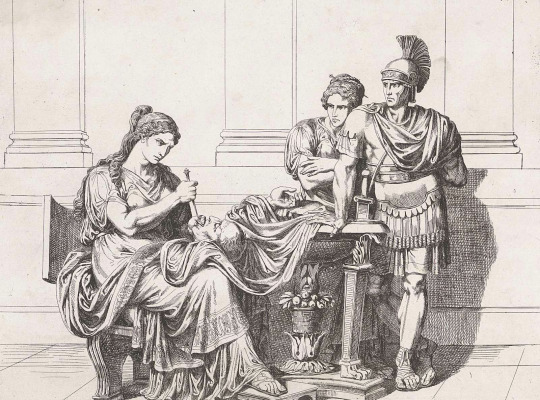
2. Émilie du Châtelet
Also hardly a surprise for anyone who's been following me for a while. Again, the fact that I've only relatively recently found out that there was a female mathematician and physicist in the fist half of the 18th century with such significant contributions to the field makes me almost feel as if I've been lied to.
She is special to me both because she was incredibly smart (she was able to understand Newton like few other people in her time and she spoke so many languages!) but there's also something about her writing that makes her feel deeply human and relatable. I've read some of her texts, and not only are they written in a beautiful prose but they're also incredibly moving. Her view on how to achieve happiness in life is one of the best I've ever came across, and her arguments for the education of women always make me feel so emotional...
...when she says that it was only after she realised that the circle of (male) French intellectuals accepted her among themselves and treated her as equal that she realised she too "might be a thinking creature"... I don't know, there's something about it that always gets to me.
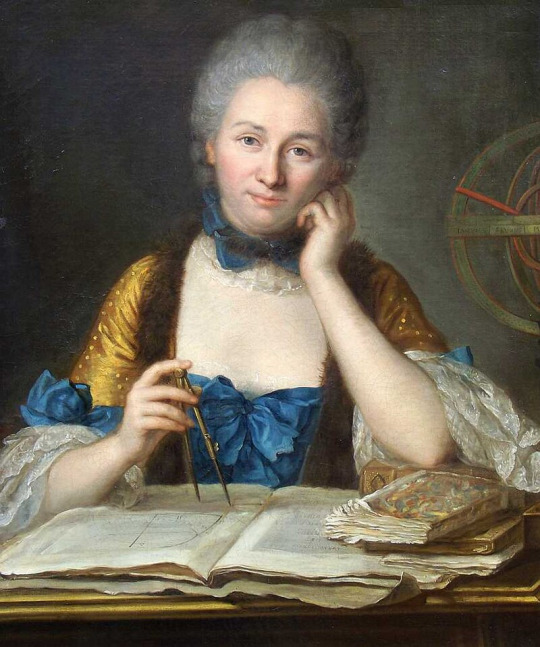
Okay, time to introduce some male historical figures as well! This one is a residue from the time when I was really into the American Revolution.
3. Peter Stephen Du Ponceau
He was probably the only one in Baron von Steuben's original group that was able to speak decent English when they first arrived in the US to join the revolutionary war, which a) makes him quite important b) is kind of funny to think about.
But what I especially like about him is that he was a talented linguist who seemed to have genuine respect for other cultures, which let's face it, was quite rare in his times. While taking part in the American Revolutionary War, he recorded and studied the languages of Native American People. How cool is that?
(He was also potentially queer and I do have a soft spot for queer history)

Okay, guess should bring up someone interesting from Czech history as well. I fully confess that my own country's history is not necessarily my favourite area of study, but for her, I'll always make an exception:
4. Milena Jesenská
Probably most well known as Kafka's (kind of?) girlfriend/pen pal, but there is so much more to her story!
She was a writer and a journalist during the first half of the 20th century. She was really talented and soon made a reputation for herself, which let's face it, wasn't an easy thing to do for women in her time.
After Czechia became occupied by Nazi Germany, she joined the resistance movement and helped Jewish families to escape. She was later transported to a concentration camp, where she worked as a nurse and was said to have been "a moral support for other prisoners". She unfortunately died there when she was only 47. Still, what a life!
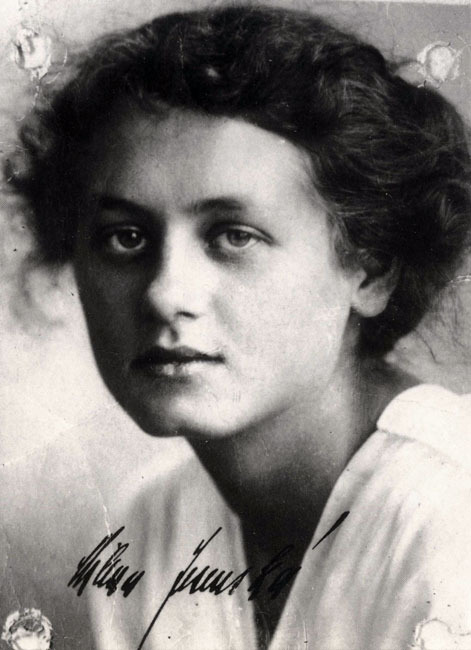
5. John Polidori
He's not necessarily my number one favourite person but I'd argue he is one of the most unappreciated figures. Vampires in fiction are massively popular but he rarely gets credited as one of its first authors. (Also the theory that Lord Ruthven, the charismatic, immoral aristocrat featured in The Vampyre is heavily based off on Lord Byron is not only entirely plausible but also quite funny).
Whenever I read something about the Geneva Squad, I always end up feeling kind of bad for him. As a foreigner, someone who was of a lower social status and - since he technically came along as Byron's personal physician - a paid employee, it just seems to me like he was never actually fully part of the group. Maybe I'm wrong, but to me, he felt kind of like a perpetual outsider. Lord Byron also got the credit for writing The Vampyre that should have gone to Polidori.
He was of course far from a perfect saint, with his drug and gambling addiction, but I still can't help but feel that he deserved better.
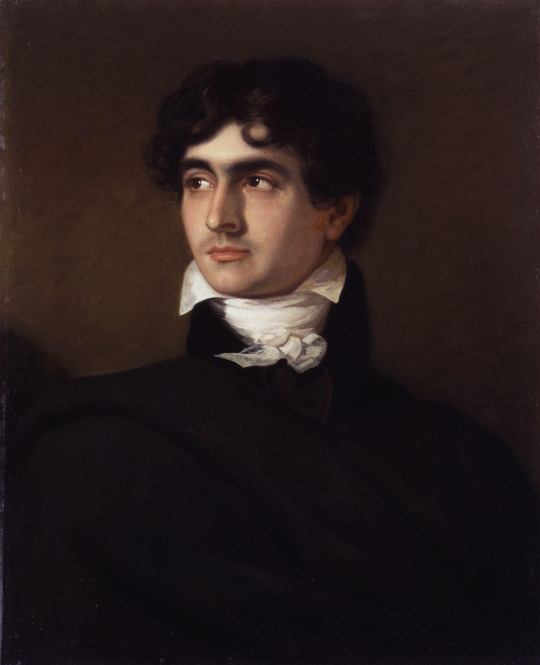
#thanks for the ask!#ask#send asks✨#sorry about taking so long I'll try to get to the other asks as soon as I'm able!#history#women's history#queer history#fulvia#roman republic#ancient rome#émilie du châtelet#age of enlightenment#1700s#18th century#milena jesenská#franz kafka#20th century#czech history#john polidori#geneva squad#lord byron#literature#romantic literature#1800s#du ponceau#american revolution#amrev
62 notes
·
View notes
Text
What did Deirdre do wrong?
Recently, I wrote a post where I put Sigurd “on trial” for three decisions he is oftentimes charged with making a mistake on. Naturally, I will move on to Sigurd’s beloved wife, Deirdre. Five years ago when I was writing the series Examining the Crusaders, I called Deirdre. When I said this, I meant that her characterization was lacking in many regards. Every so often though, a conversation will happen because someone thinks that Deirdre was disappointing in a different way – that she made the wrong choices. I will go through her different points so we can see how it is.
She shouldn’t have married Sigurd
The first charge against Deirdre is that she either married Sigurd too quickly or that she should not have married Sigurd. For simplicity’s sake, I will discuss both at once. It is well-known that Deirdre was told that she must not mingle with men. These concerns were not unfounded given that Deirdre did have minor Loptous blood and she was eventually coerced into conceiving an heir to Loptous’ power with her half-sibling Arvis. Deirdre’s ancestors who bore Loptous blood were allowed to only have one child to avoid any scenario where two holders of Loptous blood could be mated to produce a child with major Loptous blood; this was a commandment set by her ancestor Maira and broken by her mother Cigyun. This fact was not unknown to Deirdre either; if one recruits Deirdre after defeating Sandima (a hard task without the aid of Deirdre’s silence staff), she reveals to Sigurd that it is known that the dark god dwells within her blood. So, Deirdre knew the potential consequences of leaving her village and marrying a man and yet she still did it anyway. Case closed, right?
One could look at Deirdre’s choices in a different perspective. Deirdre was sheltered during her entire life due to her holy blood. The villagers of the Spirit Forest proactively stopped her from meeting any man, as seen when one of the elders tells Sigurd to drop any pursuit of her after they meet for the first time. Certainly the proscription against having relations with a man was not needless, but at the same time it stripped Deirdre of her agency to plan her own life. Does it not make sense that after twenty or so years of being prevented from forming any organic relationship, she falls head over heels for a man who treats her so well? As for the point of the Loptrians searching for Deirdre, it’s quite possible that they would have found her sooner or later given that they were already present in Verdane when Sigurd arrived. It also cannot be forgotten that the marriage between Sigurd and Deirdre produced the fruit par excellence in Seliph who would eventually lead the rebellion against the Empire and restore the rulers of each nation.
The last point I’ll touch upon is whether Deirdre married Sigurd too quickly. When I wrote about Sigurd, I said that it’s possible that Sigurd was being impulsive and putting his feelings over Deirdre’s. The relationship between the two was consensual though (unlike with Deirdre’s marriage with Arvis), so if the marriage was rushed then Deirdre has some responsibility to bear. One could say that she, too, was impulsive for marrying the first man who takes serious interest in her. Does Sigurd’s repeated wishes for Deirdre to stay home so she is protected foreshadow real tension that could have caused problems had they stayed together longer than one or two years? Maybe. It could also just be natural relationship problems – even the strongest marriages face these issues.
She let herself get kidnapped
Another accusation that has been thrown against Deirdre is that she was responsible for her kidnapping by Manfroy. It is said that Deirdre’s kidnapping was a consequence of her leaving Agusti castle. Had she stayed in Agusti (or had she been allowed to accompany Sigurd), this may have never happened. Some would add that she was irresponsible for leaving the infant Seliph on his own with Shannan and depriving him of his mother, even if it were meant to only be for a time. In the game itself, Deirdre is shown walking a significant distance from Agusti before being kidnapped by Manfroy. (Infamously, it is possible to place player units around the exact spot where she gets kidnapped and watch them do nothing.) This, though, only tells some of the story. It’s worth noting that Manfroy, being one of the most powerful mages in Jugdral, likely has no real limitations on his capability to warp. Therefore, he could have kidnapped Deirdre anywhere he wanted. In the Oosawa manga interpretation of Genealogy, Deirdre is kidnapped within the confines of Agusti rather than within the open fields. Deirdre could not reasonably take precautions against being kidnapped by a dark sorcerer who can teleport anywhere he wishes. If she bears any responsibility at all for what happened to her, it is miniscule compared to the malice perpetrated by Manfroy and the Loptrians.
She forgave Arvis
The third accusation against Deirdre that I have seen is that she was culpable in Arvis’ actions and forgave him. This seems to come from her appearance in Chapter 10 to Seliph where she expresses no malice towards Arvis and instead asks about Julius and Julia. Additionally, she was said in the FE4 Playing Guide to not hate Arvis at all even after she discovered that Sigurd was her first husband. The Playing Guide even said that she “subconsciously repented” from her crimes by not resisting Julius’ attack on her when he touched Loptous for the first time. It does need to be stated that her marriage to Arvis was not fully consensual. Since she had her mind wiped by the Loptrians, there is a strong case to be made that Deirdre was not fully capable of consenting to marriage. In many jurisdictions, her familial relationship to Arvis would also be grounds to invalidate their marriage if or when it becomes publicly known. Had she known that Arvis was her half-sibling or had she known that she was previously married to Sigurd, she would not have married Arvis. The responsibility for their marriage and the conception of Julius falls squarely on the Loptrians for orchestrating Deirdre’s kidnapping and amnesia and on Arvis for taking advantage of an amnesiac woman and choosing not to investigate her background.
It has also been said that according to the FE4 Playing Guide, Deirdre did eventually learn of her relationship with Sigurd. She has been accused of neglecting Seliph by staying at Belhalla instead of searching for him. But had she done this, she would have neglected Julia and Julius who are equally her children. It is also unclear whether she even knew of Seliph’s existence; if she did, it is unlikely she would have known where to find him. And there’s no guarantee that Arvis or the Loptrians would have allowed her to reunite with Seliph.
There is an underlying assumption behind this accusation: it is assumed that Deirdre must hate Arvis for what he did. Certainly it would be understandable for her to hate him given what he did to her. But is this the only valid way that she could feel about Arvis? She could be grateful for Arvis’ role in raising Julia and Julius and then his (mostly vain) efforts to protect Grannvale and Julia from Julius. She could also recognize that Arvis’ actions cannot lead to a cycle of revenge even if his death at the hands of Seliph was necessary. Neither of these feelings mean that Deirdre excuses Arvis or that she thinks that it was okay for him to take advantage of her. Nor does it mean that Deirdre is fully choosing to put Arvis ahead of Sigurd and Seliph. But is it wrong for Deirdre to not be angry in the afterlife when she couldn’t undo what happened anyway?
Conclusion
I do confess that I believe that there is less merit to those complaints against Deirdre than those against Sigurd, Quan, and Ethlyn. It seems to me that the charges against Deirdre are from a minority rather than being controversial among the community. That said, I still tried my best to lay them out, show the logic behind them, and offer convincing counterarguments. If you think I did not, let me know in the comments.
11 notes
·
View notes
Note
back to the idea of what if Daemon had twin daughters in the Vale instead of sons, I just so happen to have the perfect casting idea for them, hear me out:
Freya Allan (for both)
she plays (or played I’m still confused about it) Ciri on the Witcher, and she has the perfect Valyrian hair and a quick edit of her eyes to change them to purple is easy enough. but the real kicker about this is that in the new Planet of the Apes movie, she plays a character with dark hair and bright blue eyes that almost look grey at times.
naturally, this led to me making these edits:


the names would be interesting in this case. I assume Jon would go to Jeyne and Rhaegar might opt for Rhaena, unless you have another idea. the ages would also change, i assume they’d be thirteen going on fourteen, they could even be twelve going thirteen if you stretch it but they simultaneously work as late teens as well. the fun bit of HOTD is the wide range of actors having to play ages all over the place so it doesn’t matter much in this regard. Daemon and Criston look the exact same age and it’s been twenty years.
again, i have no idea where i’m going with this, but i know i wanted to get it out of my head so please enjoy. and if you have any possible Jon and Rhaegar fancasts, either as kids or teenagers please let me know, i’d love to edit them to fit their look
Confession: I initially skipped straight to the photos and went "huh, impressive, those two actresses look pretty similar, nice find to portray twins" then read the rest of your ask and was like OH WELL THAT EXPLAINS THINGS. 😅 It's actually impressive that hair/makeup/lighting can make that much of a difference!
That's a lovely cast! I'm terrible at fancasting, so whenever someone asks me I'm usually like *mumble* idk *mumble*. (I also like to leave things open so that folks can make their own without me laying down anything proscriptive.)
Names are fun, I hadn't thought about what their female equivalents would be. Jeyne and Eleyna for their Vale names, perhaps? For their Targaryen names, I think Rhaegar honors his mother with some Rhae name, perhaps even Rhaella or Rhaelle. Jon's probably less stubborn about Jeyne, since it's not a name he has any prior attachment to, but I don't know which Targaryen name he'd gravitate towards. Visenya, perhaps, for her prowess? We know Daemon would approve, given that it's a name he and Rhaenyra used in canon. Otherwise maybe something in Dany's honor.
Now I'm imagining them going with Rhaenys and Visenya, and Otto and/or Viserys being like "clearly one of them is meant for Aegon" to Daemon's consternation.
And ah yes, the Hollywood propensity for casting twenty-something (and sometimes thirty-something) actors for teens!
39 notes
·
View notes